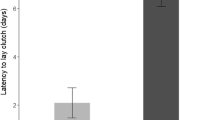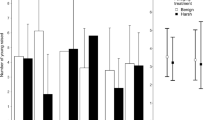Abstract
The performance of an individual can be critically influenced by its experience early in life as well as trans-generationally by the conditions experienced by its parents. However, it remains unclear whether or not the early experience of parents and offspring interact with each other and adapt offspring when the parental and own early environmental conditions match. Here, zebra finches (Taeniopygia guttata) that had experienced either early low or high nutritional conditions raised their offspring under either matched or mismatched nutritional conditions. Parental and offspring early conditions both separately affected the offspring’s adult phenotype, but early conditions experienced by parents and offspring did not interact as predicted. Offspring that grew up under conditions matching those their parents had experienced did not do better than those that grew up in a mismatched environment. Thus, transgenerational effects remain a lifelong burden to the offspring acting in addition to the offspring’s own early life experience. The lack of evidence for adaptive programming to matching environmental conditions may result from non-predictive environments under natural conditions in such opportunistic breeders.





Similar content being viewed by others
References
Arnold K, Blount J, Metcalfe N et al (2007a) Sex-specific differences in compensation for poor neonatal nutrition in the zebra finch Taeniopygia guttata. J Avian Biol 38:356–366
Arnold K, Ramsay S, Donaldson C et al (2007b) Parental prey selection affects risk-taking behaviour and spatial learning in avian offspring. Proc R Soc Lond B 274:2563–2569
Bates D, Maechler M, Dai B (2008). lme4: Linear mixed-effects models using S4 classes. R package version 0.999375-28
Birkhead T, Fletcher F, Pellatt E (1999) Nestling diet, secondary sexual traits and fitness in the zebra finch. Proc R Soc Lond B 266:385–390
Blount J, Metcalfe N, Arnold K et al (2006) Effects of neonatal nutrition on adult reproduction in a passerine bird. Ibis 148:509–514
Boag PT (1987) Effects of nestling diet ong and adult size of zebra finches (Poephila-Guttata). Auk 104:155–166
Bolund E, Schielzeth H, Forstmeier W (2011) Correlates of male fitness in captive zebra finches: a comparison of methods to disentangle genetic and environmental effects. BMC Evol Biol 11:327
Carere C, Drent P, Koolhaas J et al (2005) Epigenetic effects on personality traits: early food provisioning and sibling competition. Behaviour 142:1329–1355
Criscuolo F, Monaghan P, Nasir L et al (2008) Early nutrition and phenotypic development: ‘catch-up’ growth leads to elevated metabolic rate in adulthood. Proc R Soc Lond B 275:1565–1570
Criscuolo F, Monaghan P, Proust A et al (2011) Costs of compensation: effect of early life conditions and reproduction on flight performance in zebra finches. Oecologia 167:315–323
DeKogel C, Prijs H (1996) Effects of brood size manipulations on sexual attractiveness of offspring in the zebra finch. Anim Behav 51:699–708
Fisher MO, Nager RG, Monaghan P (2006) Compensatory growth impairs adult cognitive performance. PLoS Biol 4:1462–1466
Forstmeier W, Schielzeth H (2011) Cryptic multiple hypotheses testing in linear models: overestimated effect sizes and the winner’s curse. Behav Ecol Sociobiol 65:47–55
Forstmeier W, Segelbacher G, Mueller J et al (2007) Genetic variation and differentiation in captive and wild zebra finches (Taeniopygia guttata). Mol Ecol 16:4039–4050
Gilby A, Mainwaring M, Rollins L et al (2011) Parental care in wild and captive zebra finches: measuring food delivery to quantify parental effort. Anim Behav 81:289–295
Goerlich V, Natt D, Elfwing M et al (2012) Transgenerational effects of early experience on behavioral, hormonal and gene expression responses to acute stress in the precocial chicken. Hormon Behav 61:711–718
Griffith SC, Buchanan KL (2010) Maternal effects in the Zebra Finch: a model mother reviewed. Emu 110:251–267
Groothuis TGG, Trillmich F (2011) Unfolding personalities: the importance of studying ontogeny. Develop Psychobiol 53:641–655
Hector KL, Nakagawa S (2012) Quantitative analysis of compensatory and catch-up growth in diverse taxa. J Anim Ecol 81:583–593
Holveck MJ, Riebel K (2009) Low-quality females prefer low-quality males when choosing a mate. Proc R Soc Lond B 277:153–160
Honarmand M, Goymann W, Naguib M (2010) Stressful dieting: nutritional conditions but not compensatory growth elevate corticosterone levels in zebra finch nestlings and fledglings. PLoS ONE 5:e12930
Krause ET, Liesenjohann T (2012) Predation pressure and food abundance during early life alter risk-taking behaviour and growth of guppies (Poecilia reticulata). Behaviour 149:1–14
Krause ET, Naguib M (2011) Compensatory growth affects exploratory behaviour in zebra finches (Taeniopygia guttata). Anim Behav 81:1295–1300
Krause ET, Honarmand M, Wetzel J et al (2009) Early fasting is long lasting: differences in early nutritional conditions reappear under stressful conditions in adult female zebra finches. PLoS ONE 4:e5015
Krause ET, Steinfartz S, Caspers BA (2011a) Poor nutritional conditions during the early larval stage reduce risk-taking activities of fire salamander larvae (Salamandra salamandra). Ethology 117:416–421
Krause ET, Honarmand M, Naguib M (2011b) Zebra finch nestlings beg more under better nutritional conditions. Behaviour 148:1239–1255
Lindström J (1999) Early development and fitness in birds and mammals. Trends Ecol Evol 14:343–348
Mainwaring MC, Hartley IR (2012) Causes and consequences of differential growth in birds: a behavioural perspective. Adv Stud Behav 44:225–277
Metcalfe NB, Monaghan P (2001) Compensation for a bad start: grow now, pay later? Trends Ecol Evol 16:254–260
Monaghan P (2008) Early growth conditions, phenotypic development and environmental change. Phil Trans R Soc Lond B 363:1635–1645
Naguib M, Gil D (2005) Transgenerational effects on body size caused by early developmental stress in zebra finches. Biol Lett 1:95–97
Naguib M, Riebel K, Marzal A et al (2004) Nestling immunocompetence and testosterone covary with brood size in a songbird. Proc R Soc Lond B 271:833–838
Naguib M, Nemitz A, Gil D (2006) Maternal developmental stress reduces reproductive success of female offspring in zebra finches. Proc R Soc Lond B 273:1901–1905
Naguib M, Floercke C, van Oers K (2011) Effects of social conditions during early development on stress response and personality traits in great tits (Parus major). Develop Psychobiol 53:592–600
Nowicki S, Peters S, Podos J (1998) Song learning, early nutrition and sexual selection in songbirds. Am Zool 38:179–190
Pinheiro J, Bates D, DebRoy S, Sarkar D, R Core Team (2008) nlme: Linear and Nonlinear Mixed Effects Models. R package version 3.1-90
Price DK, Burley NT (1994) Constraints on the evolution of attractive traits: selection in male and female zebra finches. Am Nat 144:908–934
Quinn GP, Keough MJ (2002) Experimental Design and Data Analysis for Biologists. Cambridge University Press, Cambridge
R Development Core Team (2009) R: A language and environment for statistical computing. R Foundation for Statistical Computing, Vienna
Riebel K (2009) Song and female mate choice in zebra finches: a review. Adv Stud Behav 40:197–238
Riebel K, Naguib M, Gil D (2009) Experimental manipulation of the rearing environment influences adult female zebra finch song preferences. Anim Behav 78:1397–1404
Sandell MI, Adkins-Regan E, Ketterson ED (2007) Pre-breeding diet affects the allocation of yolk hormones in zebra finches Taeniopygia guttata. J Avian Biol 38:284–290
Spencer KA, Macdougall-Shackleton SA (2011) Indicators of development as sexually selected traits: the developmental stress hypothesis in context. Behav Ecol 22:1–9
Spencer K, Buchanan K, Goldsmith A et al (2003) Song as an honest signal of developmental stress in the zebra finch (Taeniopygia guttata). Hormon Behav 44:132–139
Spencer KA, Heidinger BJ, D’alba LB et al (2010) Then versus now: effect of developmental and current environmental conditions on incubation effort in birds. Behav Ecol 21:999–1004
Stamps J, Groothuis TGG (2010) The development of animal personality: relevance, concepts and perspectives. Biol Rev 85:301–325
Taborsky B (2006a) The influence of juvenile and adult environments on life-history trajectories. Proc R Soc Lond B 273:741–750
Taborsky B (2006b) Mothers determine offspring size in response to own juvenile growth conditions. Biol Lett 2:225–228
Tinbergen JM, Boerlijst MC (1990) Nestling weight and survival in individual Great tits (Parus major). J Anim Ecol 59:1113–1127
Tschirren B, Rutstein AN, Postma E et al (2009) Short- and long-term consequences of early developmental conditions: a case study on wild and domesticated zebra finches. J Evol Biol 22:387–395
van Oers K, Drent PJ, de Jong G et al (2004) Additive and nonadditive genetic variation in avian personality traits. Heredity 93:496–503
van Oers K, Klunder M, Drent PJ (2005) Context dependence of personalities: risk-taking behavior in a social and a nonsocial situation. Behav Ecol 16:716–723
Verbeek MEM, Drent PJ, Wiepkema PR (1994) Consistent individual differences in early exploratory behaviour of male great tits. Anim Behav 48:1113–1121
Verhulst S, Holveck MJ, Riebel K (2006) Long-term effects of manipulated natal brood size on metabolic rate in zebra finches. Biol Lett 2:478–480
Wells JCK (2007) The thrifty phenotype as an adaptive maternal effect. Biol Rev 82:143–172
Zann RA (1996) The zebra finch: a synthesis of field and laboratory studies. Oxford University Press, Oxford
Acknowledgments
We thank two anonymous reviewers for providing helpful comments on the manuscript. ETK was funded by a graduate scholarship of the Evangelisches Studienwerk Villigst and a research grant of the Ethologische Gesellschaft. MN was granted by the German Research Foundation (Na335/6). We thank Joe Hoffman, Anke Rehling and Barbara Caspers for comments on an earlier version of the manuscript.
Author information
Authors and Affiliations
Corresponding author
Electronic supplementary material
Below is the link to the electronic supplementary material.
Rights and permissions
About this article
Cite this article
Krause, E.T., Naguib, M. Effects of parental and own early developmental conditions on the phenotype in zebra finches (Taeniopygia guttata). Evol Ecol 28, 263–275 (2014). https://doi.org/10.1007/s10682-013-9674-7
Received:
Accepted:
Published:
Issue Date:
DOI: https://doi.org/10.1007/s10682-013-9674-7




